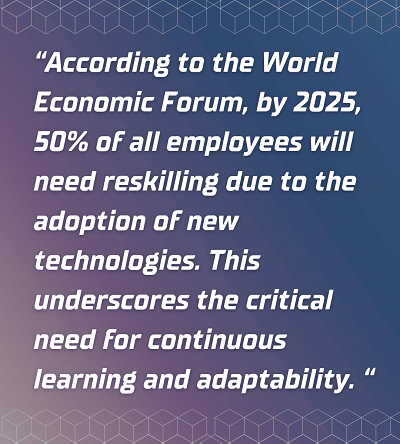Imagine you’re a seasoned professional in a well-established company. Over the years, you’ve honed your skills and built a solid reputation. Suddenly, your organization announces a comprehensive digital transformation initiative. New technologies, processes, and methodologies are being introduced at a rapid pace. You find yourself at a crossroads: adapt to this new digital landscape or risk becoming obsolete.
This scenario is becoming increasingly common as companies worldwide embrace digital transformation to stay competitive. The question then arises: How can you stay relevant and thrive in such an environment?
Understanding Digital Transformation
Digital transformation involves integrating digital technology into all areas of a business, fundamentally changing how organizations operate and deliver value to customers. It’s not merely about adopting new tools but reshaping company culture, processes, and customer experiences to meet evolving market demands. This transformation necessitates a workforce that is agile, tech-savvy, and continuously learning.
The Imperative for Continuous Learning
 In the digital age, the half-life of skills is diminishing.
In the digital age, the half-life of skills is diminishing.
According to the World Economic Forum, by 2025, 50% of all employees will need reskilling due to the adoption of new technologies. This underscores the critical need for continuous learning and adaptability. Employees who proactively update their skill sets position themselves as invaluable assets to their organizations.
Strategies to Stay Relevant
1. Embrace a Growth Mindset
Adopting a growth mindset means viewing challenges as opportunities to learn and grow. This perspective encourages resilience and a proactive approach to acquiring new skills. Organizations that foster a growth mindset culture are more likely to succeed in their digital transformation efforts.
2. Invest in Digital Literacy
Understanding the basics of emerging technologies such as artificial intelligence (AI), machine learning, blockchain, and data analytics is crucial. While you don’t need to become an expert in each, having a foundational knowledge allows you to comprehend their implications and applications within your role. For instance, pharmaceutical companies like Johnson & Johnson have implemented mandatory AI training for employees to integrate advanced technologies into their operations effectively.
3. Pursue Relevant Certifications
Enrolling in certification courses from recognized institutions can bolster your credentials and demonstrate your commitment to professional development. At Training Creatively, we offer a range of courses accredited by examination institutes such as PeopleCert, AXELOS, APMG International, BCS, IIBA, PMI, EXIN, and ISACA. These certifications cover areas like project management, business analysis, IT service management, and cybersecurity, aligning with the competencies required in a digitally transformed organization.
4. Develop Soft Skills
While technical skills are vital, soft skills like adaptability, critical thinking, collaboration, and emotional intelligence are equally important. As organizations adopt new technologies, the ability to work effectively in diverse teams and navigate change becomes paramount. A study published in the Journal of Business Research emphasizes that leadership in digital transformation requires visionary and customer-centered approaches while embracing change.
5. Engage in Cross-Functional Projects
Participating in projects that span multiple departments exposes you to different aspects of the business and the technologies being implemented. This not only broadens your skill set but also increases your visibility within the organization. Employees who actively seek out such opportunities are often seen as proactive and adaptable.
6. Seek Mentorship and Networking Opportunities
Connecting with colleagues who have expertise in digital areas can provide valuable insights and guidance. Mentorship can accelerate your learning curve and help you navigate the complexities of digital transformation. Additionally, building a robust professional network can open doors to new opportunities and collaborations.
7. Stay Informed About Industry Trends
Regularly reading industry publications, attending webinars, and participating in professional forums can keep you abreast of the latest developments. Understanding where your industry is headed allows you to anticipate changes and prepare accordingly.
Case Study: Henkel’s Digital Upskilling Initiative
Henkel, a global consumer goods company, recognized the need to upskill its workforce to drive innovation and growth in the digital era. Partnering with Accenture, Henkel launched a comprehensive digital upskilling program aimed at fostering a culture of continuous learning and equipping employees with the necessary skills to navigate digital transformation.
Key Components of the Program:
- Customized Learning Journeys: Tailored programs were developed for various functions, including IT, Finance, Marketing, Sales, and Purchasing, ensuring relevance to each department’s needs.
- Leadership Involvement: Executives actively participated, signaling the organization’s commitment to learning and setting a precedent for employees.
- Flexible Learning Platforms: A new learning management system was implemented, allowing employees to access courses at their convenience, accommodating different learning styles and schedules.
Outcomes:
- Rapid Implementation: The learning management system was rolled out in 18 weeks, demonstrating the organization’s agility.
- High Engagement: Employees completed over 215,000 e-learning courses, reflecting a strong commitment to personal development.
- Culture Shift: The initiative cultivated an environment where continuous learning became embedded in the organizational culture, driving innovation and adaptability.
This case study exemplifies how strategic upskilling initiatives can empower employees to remain relevant and contribute meaningfully in a digitally transforming organization.
Conclusion
Staying relevant in an organization undergoing digital transformation requires a proactive approach to learning and adaptability. By embracing a growth mindset, investing in both technical and soft skills, pursuing relevant certifications, and engaging in cross-functional collaborations, you position yourself as a valuable asset in the digital age.
Visit www.trainingcreatively.com to explore our comprehensive range of accredited certification courses and embark on a transformative learning journey today!
Contact us today!
E-mail – enquiries@trainingcreatively.com
Phone No. – +44 (0) 20 8500 4534
Address – Suite 156, Rosden House,
372 Old Street, London, EC1V 9AU, United Kingdom
